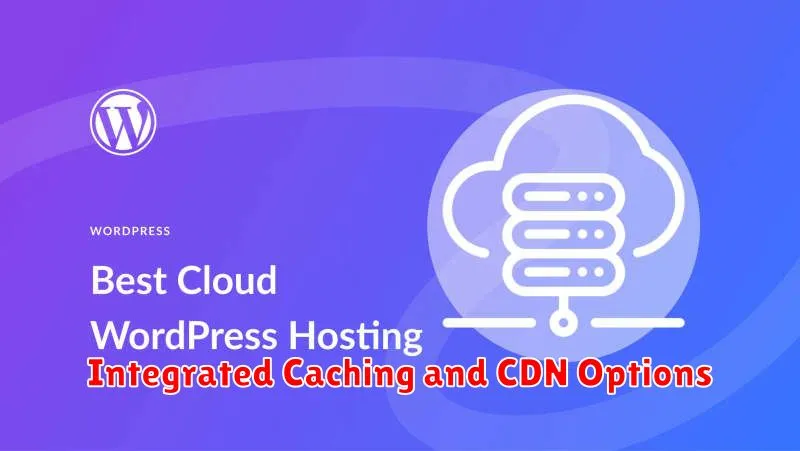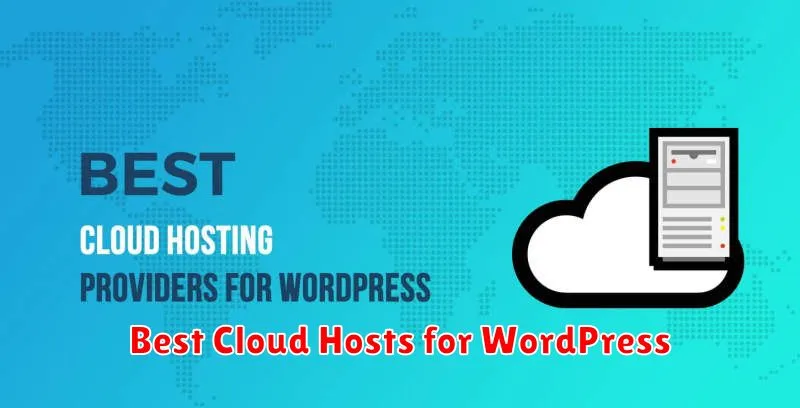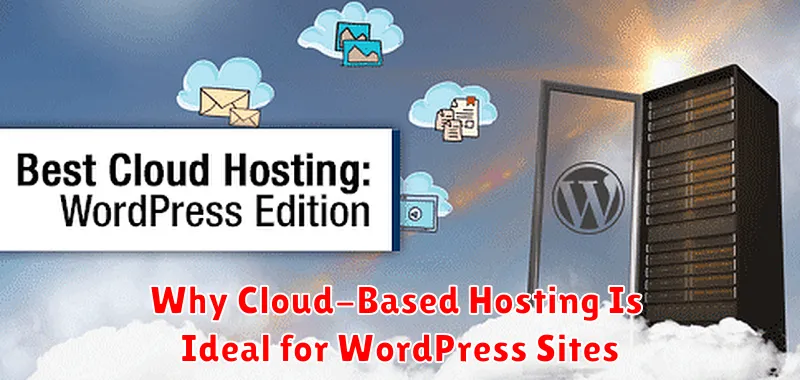Are you considering a new home for your WordPress site? Perhaps you’re launching a fresh blog or looking to migrate an existing one. Choosing the right hosting environment can significantly impact your website’s performance, security, and scalability. Cloud-based hosting has emerged as the ideal solution for WordPress sites of all sizes, offering a compelling blend of power, flexibility, and affordability. This article will explore the key reasons why cloud hosting is the optimal choice for powering your WordPress presence, from improved loading speeds and enhanced security to unparalleled scalability and cost-effectiveness.
Traditional hosting solutions often struggle to keep pace with the demands of modern WordPress websites. Cloud hosting, however, leverages the power of distributed computing to provide superior performance and reliability. By distributing your website’s resources across multiple servers, cloud hosting ensures that your site remains accessible and responsive even during traffic spikes. Discover how embracing cloud-based hosting for your WordPress site can unlock its true potential, enabling seamless growth and providing a superior experience for your visitors.
WordPress Performance on the Cloud
Cloud hosting offers significant performance advantages for WordPress websites. Scalability is a key benefit, allowing resources like RAM and CPU to automatically adjust based on traffic demands. This ensures your site remains responsive even during traffic spikes, preventing slowdowns and downtime.
Furthermore, cloud hosting providers often utilize Content Delivery Networks (CDNs). CDNs store cached copies of your website’s static content (images, CSS, JavaScript) on servers located around the world. This reduces latency and improves loading times for visitors regardless of their geographic location.
Solid State Drives (SSDs) are commonly used in cloud environments. SSDs offer significantly faster read/write speeds compared to traditional hard drives, resulting in quicker database queries and faster page load times. This enhanced speed directly contributes to a better user experience and improved search engine rankings.
Finally, many cloud platforms offer built-in caching mechanisms and tools for optimizing WordPress performance. These features can further enhance your site’s speed and efficiency.
Auto-Scaling for Traffic Spikes
One of the most significant advantages of cloud-based hosting for WordPress is its ability to handle traffic spikes seamlessly through auto-scaling. Traditional hosting often struggles with sudden surges in traffic, potentially leading to slow loading times or even site crashes. Cloud hosting, however, can dynamically adjust resources to meet demand.
When a traffic spike occurs, the cloud platform automatically provisions additional server resources, such as CPU, RAM, and bandwidth. This ensures your website remains responsive and performs optimally even under heavy load. As traffic subsides, the allocated resources are scaled back down, optimizing costs. This eliminates the need for manual intervention or over-provisioning resources in anticipation of potential traffic spikes.
Auto-scaling provides significant benefits for businesses that experience unpredictable traffic patterns, such as e-commerce sites during sales events or blogs with viral content. It ensures a consistent user experience and protects against lost revenue due to site downtime.
Integrated Caching and CDN Options

Cloud-based hosting frequently offers integrated caching and Content Delivery Network (CDN) options. These features significantly enhance website performance and user experience.
Caching mechanisms store static copies of your website’s content. When a visitor accesses your site, the cached version is served, reducing the load on your server and resulting in faster loading times. Cloud platforms often provide various levels of caching, from server-side caching to browser caching, allowing for optimized content delivery.
A CDN distributes your website’s content across a network of servers geographically located closer to your users. This proximity minimizes latency, ensuring faster content delivery regardless of the user’s location. CDNs also contribute to improved website availability and resilience by distributing the load and mitigating the impact of traffic spikes or server outages in a single location.
These integrated solutions simplify the process of implementing performance-enhancing features. Instead of relying on third-party plugins or services, you can often activate caching and CDN directly through your hosting provider’s control panel. This streamlined approach reduces complexity and simplifies website management.
Security and Backup Features
Security is a critical aspect of any website, and even more so for businesses. Cloud hosting providers often implement robust security measures, including firewalls, intrusion detection systems, and regular security audits. These measures help protect your WordPress site from malware, hacking attempts, and other online threats. Many providers offer advanced security features at additional cost, such as malware scanning and removal, and DDoS protection. Choosing the right security level will depend on your specific business needs.
Data loss can be devastating. Cloud hosting offers automated backup solutions that regularly create copies of your website’s files and databases. These backups can be easily restored in case of data corruption, accidental deletion, or other unforeseen events. The frequency of backups and the retention period may vary between providers. Ensure that the backup schedule meets your recovery requirements.
Easy Deployment with One-Click Installs
One of the most significant advantages of cloud-based hosting for WordPress is the streamlined deployment process. One-click installs make setting up a WordPress site remarkably simple. Instead of manually configuring databases and uploading files via FTP, cloud hosting providers offer automated solutions.
With a few clicks, you can select your desired WordPress version, choose a domain name, and provision resources. The cloud provider handles the technical complexities in the background, allowing you to focus on building and customizing your website. This simplified setup dramatically reduces deployment time, making it ideal for both beginners and experienced users.
This ease of deployment also extends to updates and maintenance. Cloud platforms often automate core WordPress updates, plugins, and themes, ensuring your site remains secure and performs optimally. This automated maintenance frees you from tedious administrative tasks, allowing you to concentrate on content creation and business growth.
Best Cloud Hosts for WordPress

Choosing the right cloud hosting provider is crucial for WordPress site performance and scalability. Several providers stand out for their specialized WordPress offerings. Kinsta, a premium managed WordPress host, offers a robust platform built on Google Cloud. They provide excellent performance, automatic backups, and expert WordPress support.
Cloudways is another strong contender, offering managed cloud hosting on various platforms like AWS, Google Cloud, and DigitalOcean. This gives users flexibility and choice. They provide optimized WordPress environments, automated backups, and 24/7 support.
SiteGround, while not solely cloud-based, offers a highly optimized WordPress hosting environment leveraging Google Cloud infrastructure. Their managed WordPress plans include automatic updates, caching, and security features.
For users comfortable with more technical management, platforms like Google Cloud, Amazon Web Services (AWS), and DigitalOcean offer powerful cloud solutions. However, these require more direct server administration and WordPress configuration.
When Not to Use Cloud for WordPress
While cloud hosting offers numerous advantages for WordPress, certain situations may make it less suitable. If your site has extremely low traffic and minimal resource requirements, a basic shared hosting plan might be more cost-effective. Cloud’s scalability, while beneficial for growth, can be an unnecessary expense when resources aren’t being utilized.
Technical Expertise can be a barrier for some users. Managing a cloud environment often requires more hands-on technical knowledge compared to managed WordPress hosting. If you lack the skills or resources to handle server configurations, security, and updates, the added complexity might be overwhelming.
Compliance and Regulatory Requirements may restrict the use of cloud hosting in certain industries. Some regulations dictate specific data storage locations or security protocols that may not be fully compatible with certain cloud providers. Carefully assess your industry’s compliance needs before opting for cloud hosting.
Lastly, certain cloud providers may have Limited Plugin or Theme Compatibility. Although rare, it’s worth checking if your essential plugins or theme have specific server requirements that might conflict with your chosen cloud environment. This is particularly relevant for highly customized or niche WordPress setups.

